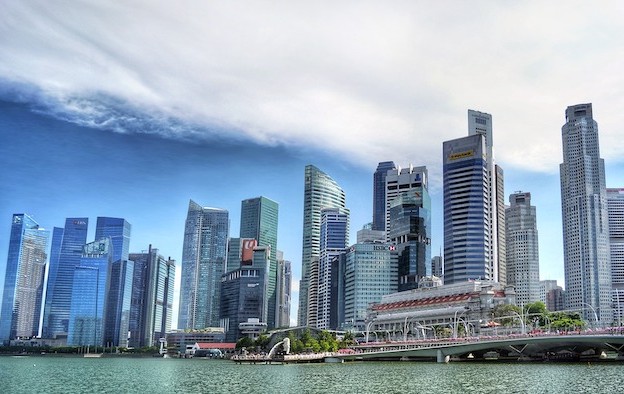HK-Sing travel bubble flights start Nov 22 say authorities
Nov 11, 2020 Newsdesk Latest News, Singapore, Top of the deck

The first of a sequence of once-per-day flights in each direction, enabling residents of Hong Kong and Singapore respectively to travel back and forth between the places quarantine-free, via a “travel bubble”, will set off on November 22, said Hong Kong’s Secretary for Commerce and Economic Development, Edward Yau Tang-wah, in a Wednesday press briefing.
A number of investment analysts has said that curbs on inbound travel to Singapore (pictured) amid the Covid-19 pandemic, have been a constraint on business recovery for Singapore’s two casino resorts. At Marina Bay Sands – one of them – third-quarter casino revenue was US$197 million, down 64.4 percent year-on-year from the US$553 million on a year earlier, said the resort’s parent Las Vegas Sands Corp in its recent earnings announcement.
Under the Hong Kong-Singapore travel bubble – currently limited to air travel, rather than including cruise business – there will be one flight per day into each city, with each flight allowed to carry a maximum of 200 passengers.
That is according to respective announcements of the Hong Kong and Singapore authorities on Wednesday. If all goes well – in terms of incidence of Covid-19 in the two places – two daily flights in each direction may be permitted from December 7.
The scheme covers general travel – not just official and business journeys – as long as would-be travellers can provide certification they have tested negative for Covid-19 infection.
The virus test result would have to be obtained within 72 hours prior of each traveller departing their home city. The scheme also only applies to travellers who had been in either city for at least 14 days before departure; and are not transit passengers.
Mr Yau also noted to the media that cost of travel for Singaporeans heading to Hong Kong would be up to circa HKD6,100 (US$787) – including return flight and two Covid-19 tests, one for outbound and one inbound before leaving Hong Kong.
Residents of Hong Kong would need to take a test only in order to leave Hong Kong, but wouldn’t need to take one on arrival in Singapore, said Singapore’s Transport Minister, Ong Ye Kung, explaining the air travel bubble on Wednesday. But the city-state requires incoming travellers to download a contact tracing app called “TraceTogether” and apply for an “Air Travel Pass”.
In is Wednesday comments, Hong Kong official Mr Yau noted that Singapore was the first of “11 countries” with which Hong Kong – a special administrative region of China – had been in talks regarding forming a travel bubble.
He said the Hong Kong-Singapore air travel bubble would face suspension for two weeks, if the seven-day moving average of the daily number of unlinked Covid-19 infection cases is more than five in either Singapore or Hong Kong. But a travel bubble could resume if the seven-day moving average on the last day of the suspension period was five or fewer.
Singapore had already eased border restrictions for travellers from mainland China, Australia, Brunei Darussalem, New Zealand and Vietnam.
The Singapore transport minister said in a video message, that the air travel bubble with Hong Kong was “one of its kind in the world”, as the quarantine-free travel arrangement encompassed what in normal circumstances were two “aviation hubs of Asia”.
“This is as close as it gets to cross-border travel [as seen] pre-Covid 19, and this is only possible because both Singapore and Hong Kong have successfully controlled the spread of Covid-19. This is very precious and not to be taken lightly,” said Mr Ong in the video message.
(updated 3.27 pm, Nov 11)
Related articles
-
 MBS Tower 3 rooms revamp now by 2Q...
MBS Tower 3 rooms revamp now by 2Q...Jul 25, 2024
-
 Nearly 60 people indicted in Macau for...
Nearly 60 people indicted in Macau for...Jul 19, 2024
More news
-
 Donaco EBITDA up y-o-y to above US$4mln...
Donaco EBITDA up y-o-y to above US$4mln...Jul 26, 2024
-
 HK listed Palasino upgrades Czech...
HK listed Palasino upgrades Czech...Jul 26, 2024
Latest News
Jul 26, 2024
Border-casino operator Donaco International Ltd has achieved a 164.17-percent year-on-year increase in its latest quarterly group earnings before interest, taxation, depreciation and amortisation...Sign up to our FREE Newsletter
 (Click here for more)
(Click here for more)
Pick of the Day
”We’ve got more traction outside of Macau at the moment. But Macau’s going be a bigger focus for us”
David Punter
Regional representative at Konami Australia
Most Popular
 Sheraton brand to exit Londoner Macao, to be Londoner Grand July 25, 2024
Sheraton brand to exit Londoner Macao, to be Londoner Grand July 25, 2024  Macau regulator probes unlicensed gaming agents July 24, 2024
Macau regulator probes unlicensed gaming agents July 24, 2024  Philippines gives 20k aliens in POGOs 60 days to leave July 25, 2024
Philippines gives 20k aliens in POGOs 60 days to leave July 25, 2024  Philippines-listed DigiPlus says not affected by POGO ban July 24, 2024
Philippines-listed DigiPlus says not affected by POGO ban July 24, 2024  Sands China 2Q EBITDA down q-o-q amid low hold, renovation July 25, 2024
Sands China 2Q EBITDA down q-o-q amid low hold, renovation July 25, 2024






